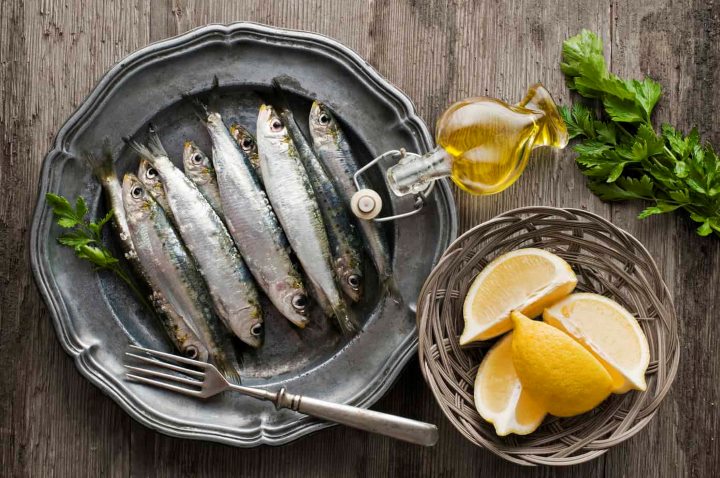Pregnancy is a time when a woman’s dietary choices play a crucial role in ensuring both her and her baby’s health. With the multitude of foods available, it can be challenging to navigate which ones are safe and beneficial for both the mother and the baby. Sardines, being a nutrient-dense food, have been a topic of interest for pregnant women. In this article, we’ll explore all you need to know about eating sardines during pregnancy, covering their safety, benefits, and how to consume them wisely.
In This Article:
- Can You Eat Sardines While Pregnant?
- Can Sardines Be A Healthy Choice For Pregnant Women?
- Do Sardines Have High Mercury?
- Benefits of Eating Sardines During Pregnancy
- How to Consume Sardines While Pregnant?
- Precautions for Having Sardines in Pregnancy
Can You Eat Sardines While Pregnant?
Sardines can be a great addition to a pregnant woman’s diet. They are a rich source of omega-3 fatty acids, which are essential for the baby’s brain and eye development. Additionally, sardines are high in protein, vitamin D, and calcium, all of which are important for the overall growth and development of the baby.
Can Sardines Be A Healthy Choice For Pregnant Women?
Yes, sardines can be a healthy choice for pregnant women. Their nutritional profile makes them an excellent option for meeting the increased nutrient demands during pregnancy. Omega-3 fatty acids, in particular, play a crucial role in the development of the baby’s nervous system and may also help reduce the risk of preterm birth.
Moreover, sardines are a valuable source of protein, which is essential for the development of the baby’s muscles, organs, and tissues. The abundant supply of calcium and vitamin D in sardines also supports the mother’s bone health and helps in the baby’s bone development.
Do Sardines Have High Mercury?
One of the primary concerns with fish consumption during pregnancy is the risk of exposure to high levels of mercury, which can adversely affect the baby’s developing nervous system. Fortunately, sardines are low in mercury compared to larger fish such as swordfish, sharks, or king mackerel. This makes them a safer choice for pregnant women who want to benefit from the nutritional value of fish without exposing themselves to high levels of mercury.
However, it is important to consume sardines in moderation, as excessive intake of any fish can potentially lead to mercury accumulation in the body. The Food and Drug Administration (FDA) recommends that pregnant women can safely consume 2-3 servings of fish per week, including sardines. It is advisable to choose fish that are low in mercury to minimise any potential risks.
Benefits of Eating Sardines During Pregnancy
Rich Source of Omega-3 Fatty Acids:
Sardines are packed with omega-3 fatty acids, particularly DHA and EPA, which are crucial for the development of the baby’s brain and eyes.
High in Protein:
Protein is essential for the growing foetus, and sardines provide a high-quality, easily digestible source of protein.
Calcium and Vitamin D:
Sardines are a good source of calcium and vitamin D, which are important for the development of the baby’s bones and teeth.
Low in Mercury:
Compared to larger fish, sardines are low in mercury, making them a safer seafood choice for pregnant women.
Omega-3 for Mood Support:
Omega-3 fatty acids can also help support the mother’s mood and reduce the risk of postpartum depression.
Iron Content:
Sardines are rich in iron, which can help prevent anaemia during pregnancy and support the baby’s growth.
Healthy Fats:
Sardines are a great source of healthy fats, which are important for the baby’s brain development and overall growth.
How to Consume Sardines While Pregnant?
Choose Fresh or Canned Sardines:
Fresh sardines can be grilled, baked, or pan-seared for a delicious and nutritious meal. Canned sardines, especially those packed in olive oil, are convenient and can be added to salads or sandwiches.
Watch Portion Sizes:
While sardines are highly beneficial, it’s important not to overconsume them due to their moderate purine content. It is recommended to have them in moderation, a few times a week.
Be Mindful of Mercury Levels:
While sardines are low in mercury, it’s still important to be mindful of overall mercury intake from all sources of fish and seafood during pregnancy.
Consider Mercury-Free Supplements:
If concerned about mercury exposure, pregnant women can also consider omega-3 supplements derived from algae, which provide DHA and EPA without the risk of mercury.
Pair with Balanced Meals:
Sardines can be paired with whole grains, leafy greens, and other colourful vegetables to create well-rounded, nutrient-dense meals.
Check for allergies:
If it’s the first time consuming sardines, pregnant women should be observant of any allergic reactions and consult a doctor in case of doubt or concern.
Precautions for Having Sardines in Pregnancy
While sardines offer numerous health benefits, there are certain precautions that pregnant women should be mindful of when consuming them. As with any fish, sardines may contain mercury, which can be harmful to the baby’s developing nervous system. Therefore, it is advisable to limit sardine consumption to the recommended amount to minimise exposure to mercury. Furthermore, pregnant women with fish allergies or sensitivities should avoid sardines altogether to prevent any adverse reactions.
It is crucial to consult with a healthcare provider before making any significant changes to your diet during pregnancy. Your healthcare provider can offer personalised guidance based on your individual health status and dietary needs.
Conclusion
In conclusion, sardines can be a healthy and safe food choice for pregnant women when consumed in moderation and prepared in a way that minimises potential risks. Their rich nutritional profile makes them a valuable addition to a pregnancy diet. However, as with any dietary decision during pregnancy, it’s essential to consult with a healthcare professional to ensure that sardines align with individual health needs and considerations.
Sources:
